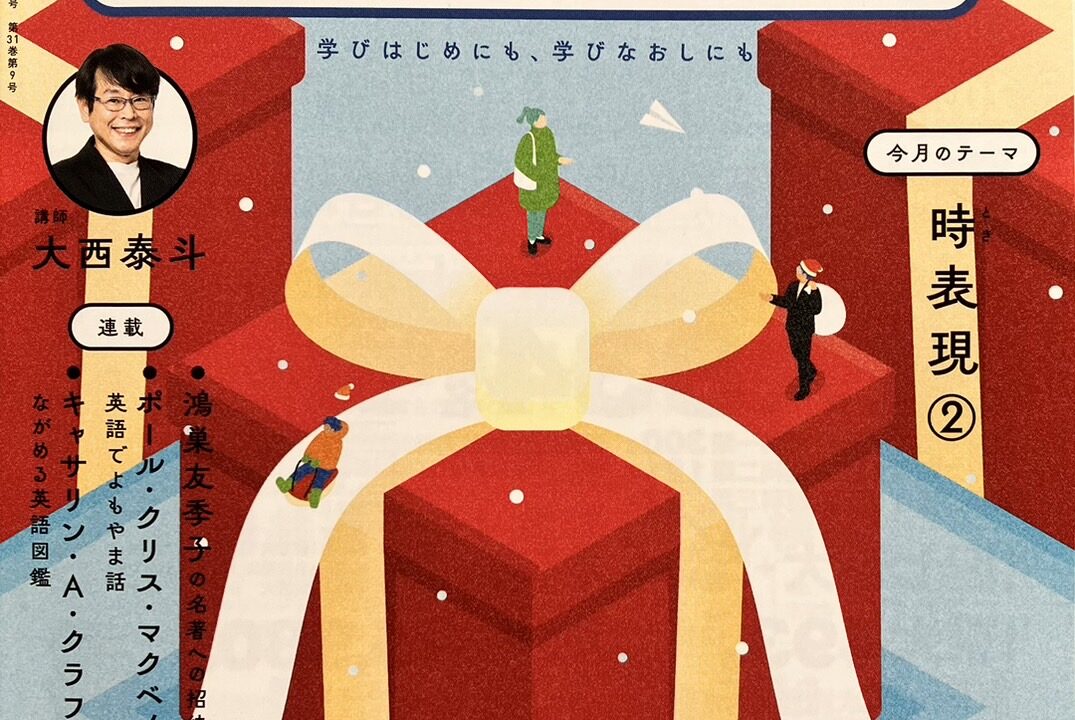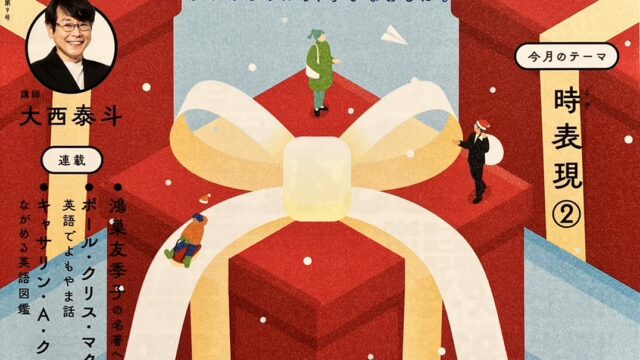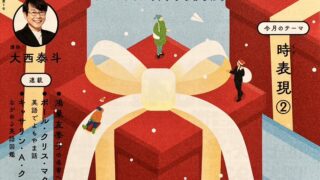【ラジオ英会話】Lesson 166 助動詞+完了形②そのほかの助動詞+完了形 – December 9 Monday, 2024

December 9 Monday, 2024
Lesson 166 助動詞+完了形②そのほかの助動詞+完了形
★Opening
R: Hey everyone. This is Akino Roza. And we want to present you with a token of our appreciation. Today’s lesson!
D: That’s right! Hi everyone. I’m David Evans.
☆Words & Phrases
I want to thank you for managing the band this year.
**breath of fresh air:
I know you’re new to the band, but you’ve been like a breath of fresh air.
**compliment:
Wow, that’s such a nice compliment.
**token:
I mean it. And we want to present you with a token of our appreciation.
**wait a sec:
Wait a sec, where is it?
☆Grammar and Vocabulary
I haven’t really done much yet.
not + 強い表現
この文では not と really の位置に注意!「not + 強い表現」のコンビネーション
not は後続の語句を否定する
この文では really(本当に)が否定されているため「本当に~というわけではない=それほど~ではない」となる
not always ~
not ~ very much
など、頻繁に使われる形
You’ve been like a breath of fresh air.
現在完了形(継続)
現在完了形のイメージは「(今に)迫ってくる」
この文では過去から現在に至るまで「そうあり続けている」と、同じ状態が続いていることを表している

☆Target Forms
I must have left it in the car.
「助動詞 + 完了形」で使われる助動詞は will だけではない
must have + 過去分詞(~だったにちがいない)も頻繁に使われる。完了形は「そのときまでに」。現在までの時点で何かが起こったと確信している
Practice
「そのときまでに」を意識しながら「must have + 過去分詞」の形を作ります。must have は「1単語」として扱いましょう。日本語でも「だったにちがいない」 は、まとまって口から出てきますよね。
must have left
↓
I must have left it in the car.
① They may have used a different route.
→ may が完了形と結びつき、それ以前の出来事について「~したかもしれない」
② I should have brought more cash.
That should have been the correct answer.
→ should には「~すべき」「~であるはず」の2つの意味がある。それぞれに対応する完了形バージョンを覚えておくこと
「すべき」の完了形バージョンは「~すべきだった」と後悔を表す形
「はず」の完了形バージョンは「~だったはず」
③ He cannot have wanted to do that.
→ cannot は「~するはずがない」で、可能性の強い否定。完了形と結びつき「~したはずはない」
④ Sorry to have kept you waiting.
→ 完了形は助動詞だけでなく、to不定詞と結びつくこともある
意味は「そのときまでに」で、この文は「これまでお待たせして」ということ。時系列をしっかり述べたいときに使う
O: It’s also good to say, “Sorry to keep you waiting.”
D: That’s okay, too, yeah!
★Practice
R: Okay guys. Are you ready? Let’s practice the different「助動詞」that can work with the「完了形」
D: All right. Let’s jump right in.
R:
– may have used, may have used
– They may have used a different route.
D:
– should have brought, should have brought
– I should have brought more cash.
– should have been, should have been
– That should have been the correct answer.
R: keep going,
– cannot have wanted, cannot have wanted
– He cannot have wanted to do that.
D: All right. Let’s wrap up with one more,
– to have kept, to have kept
– Sorry to have kept you waiting.
D: Unlock your potential.
R: Repetition is the key!
D&R: Great work!
☆Grammar in Action
①これはサムの杖です。彼はそれを持っていくのを忘れたにちがいありません。
**cane:
**forget to ~:
②ラッセルに電話してくれない?彼は道に迷ったのかもしれない。
**get lost:
③ごはんのお代わりを食べるべきではありませんでした。もうおなかいっぱいでデザートを食べることができません!
**second bowl of rice:
**too full:
★Ending
O: Hey guys. What do you think Bill was going to give to Stacy?
D: I don’t know…But it’s in a car, so I hope it wasn’t an ice cream cake.
O: How about you, Roza?
R: I mean, I think it was probably something like a T-shirt with a picture of his face on it.
O: I hope it’s not “miniature Kinkakuji.”
December 9 Monday, 2024
Lesson 166 助動詞+完了形②そのほかの助動詞+完了形
(日本語訳・解説付き)
★Opening
R: Hey everyone. This is Akino Roza. And we want to present you with a token of our appreciation. Today’s lesson!
そして私たちから感謝の気持ちを込めて、今日のレッスンをお届けします!
D: That’s right! Hi everyone. I’m David Evans.
その通り!
☆Words & Phrases
I want to thank you for managing the band this year.
ステイシー、君が今年、このバンドの面倒を見てくれたことを感謝させてほしい。
※ want to thank you ~(感謝させてほしい)は、感謝の意を表明する準備をしている印象です(実際プレゼントを用意していたようですよね、置き忘れたけど💦)
**breath of fresh air: 新鮮な息吹、新たな風
I know you’re new to the band, but you’ve been like a breath of fresh air.
確かに君はこのバンドの新入りだけど、新鮮な息吹のような存在だったよ。
※ new to the band で「バンドの新入り」ですね!なかなか出てこない表現です。覚えておきましょう
**compliment: 褒め言葉、おせじ
Wow, that’s such a nice compliment.
まあ、なんてすてきな褒め言葉かしら。
※ such (a) は「名詞」を強調するときに使います!
**token: 印(しるし)、証拠
I mean it. And we want to present you with a token of our appreciation.
それは本心さ。そこで、僕たちから君に感謝の印を贈りたいんだ。
※ I mean it. は「私は本気です」
※ token of our/my appreciation は「私たち/私の感謝のしるし」としてまとめて覚えておきましょう!
**wait a sec: ちょっと待つ
Wait a sec, where is it?
ちょっと待った、どこにあったかな?
※ wait a sec の sec は second ですね
☆Grammar and Vocabulary
I haven’t really done much yet.
私はまだ、それほど大したことはしていません。
not + 強い表現
この文では not と really の位置に注意!「not + 強い表現」のコンビネーション
not は後続の語句を否定する
この文では really(本当に)が否定されているため「本当に~というわけではない=それほど~ではない」となる
not always ~(いつも~とは限らない)
not ~ very much(それほど~ではない)
など、頻繁に使われる形
You’ve been like a breath of fresh air.
あなたは新鮮な息吹のような存在です。
現在完了形(継続)
現在完了形のイメージは「(今に)迫ってくる」
この文では過去から現在に至るまで「そうあり続けている」と、同じ状態が続いていることを表している

☆Target Forms
I must have left it in the car.
私はそれを車の中に置き忘れたにちがいありません。
「助動詞 + 完了形」で使われる助動詞は will だけではない
must have + 過去分詞(~だったにちがいない)も頻繁に使われる。完了形は「そのときまでに」。現在までの時点で何かが起こったと確信している
Practice
「そのときまでに」を意識しながら「must have + 過去分詞」の形を作ります。must have は「1単語」として扱いましょう。日本語でも「だったにちがいない」 は、まとまって口から出てきますよね。
must have left
↓
I must have left it in the car.
① They may have used a different route.
彼らは違ったルートを使ったのかもしれません。
→ may が完了形と結びつき、それ以前の出来事について「~したかもしれない」
② I should have brought more cash.
私はもっと現金を持ってくるべきでした。
That should have been the correct answer.
それが正解だったはずです。
→ should には「~すべき」「~であるはず」の2つの意味がある。それぞれに対応する完了形バージョンを覚えておくこと
「すべき」の完了形バージョンは「~すべきだった」と後悔を表す形
「はず」の完了形バージョンは「~だったはず」
③ He cannot have wanted to do that.
彼がそうすることを望んだはずはありません。
→ cannot は「~するはずがない」で、可能性の強い否定。完了形と結びつき「~したはずはない」
④ Sorry to have kept you waiting.
お待たせしてすみません。
→ 完了形は助動詞だけでなく、to不定詞と結びつくこともある
意味は「そのときまでに」で、この文は「これまでお待たせして」ということ。時系列をしっかり述べたいときに使う
O: It’s also good to say, “Sorry to keep you waiting.”
“Sorry to keep you waiting.” と言うのもいいですね。
D: That’s okay, too, yeah!
そうそう、それもいいですね!
★Practice
R: Okay guys. Are you ready? Let’s practice the different「助動詞」that can work with the「完了形」
D: All right. Let’s jump right in.
R:
– may have used, may have used
– They may have used a different route.
D:
– should have brought, should have brought
– I should have brought more cash.
– should have been, should have been
– That should have been the correct answer.
R: keep going,
– cannot have wanted, cannot have wanted
– He cannot have wanted to do that.
D: All right. Let’s wrap up with one more,
– to have kept, to have kept
– Sorry to have kept you waiting.
D: Unlock your potential.
R: Repetition is the key!
D&R: Great work!
☆Grammar in Action
①これはサムの杖です。彼はそれを持っていくのを忘れたにちがいありません。
This is Sam’s cane. He must have forgotten to take it.
**cane: 杖
**forget to ~: ~するのを忘れる
②ラッセルに電話してくれない?彼は道に迷ったのかもしれない。
Can you call Russell? He may have gotten lost.
**get lost: 道に迷う・迷子になる
③ごはんのお代わりを食べるべきではありませんでした。もうおなかいっぱいでデザートを食べることができません!
I shouldn’t have eaten that second bowl of rice. Now I’m too full for dessert!
**second bowl of rice: ご飯のお代わり
**too full: 満腹すぎる →「食べられない」という否定的な意味となる
★Ending
O: Hey guys. What do you think Bill was going to give to Stacy?
ねえみんな。ビルはステイシーに何を渡そうとしてたと思う?
D: I don’t know…But it’s in a car, so I hope it wasn’t an ice cream cake.
さあねえ…でも車の中にあるみたいだから、アイスクリームケーキじゃないことを祈るよ。
O: How about you, Roza?
ローザはどう思う?
R: I mean, I think it was probably something like a T-shirt with a picture of his face on it.
うーん、たぶん彼の顔がプリントされたTシャツとかじゃないかな。
O: I hope it’s not “miniature Kinkakuji.”
「ミニチュア金閣寺」じゃないことを願うよ。
名古屋駅前【AI×英会話】名古屋BEGビジネス英会話ジム – AIで鍛えるビジネスで使える英語力。仕事も日常も、一歩先へ。
営業時間:平日 9:00~21:00 土曜日 9:00~19:00(日祝休み)
〒450-0002 愛知県名古屋市中村区名駅2丁目40-16 名駅野村ビル 5階



